
 |
RECREATION |
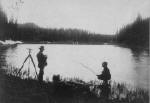 |
1880s Grand Mesa provided recreation from the earliest days. Scenic beauty, and abundant fishing and hunting were appreciated by the settlers. Summer homes and resorts began to be built, usually near cool lakes. Glade Park also was a summer favorite. Winter sports were sledding and skating. Skiing came later. |
|
|
|
|
 |
1900s First held in 1887, the Mesa County fairs were initially held at 7th and Patterson, then at Lincoln Park. Over the next two decades some of these annual celebrations were tailored into �Peach Day� festivals, focusing on one of the county�s most delectable and sought-after products. President William H. Taft visited the fair on his way to Montrose in 1909 to dedicate the Gunnison Irrigation Tunnel. |
|
|
|
|
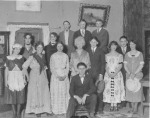 |
1920s Plays and operettas were staged by Grand Junction High School students, and were attended by enthusiastic students and the public. The Senior Class play of 1925 was �The Rejuvenation of Aunt Mary.� Another play and two operettas were performed that year, usually at the Avalon Theatre to accommodate the crowds. |
|
|
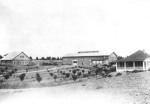 |
1930s Copeco was a large pear and apple orchard owned by Earl Craven and partners. There was a club house for employees, and the spacious fruit packing building had a hardwood floor which also served for dances. Beginning in the 1930s a commercial dance hall, called Copeco, occupied the building. Dancing was popular, with a dozen ballrooms in the valley. |
|
|
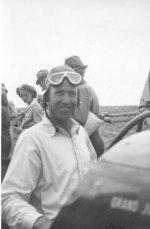 |
1940s On the west side of Grand Mesa, the Lands End Road is a challenging climb. A long steep grade, it has multiple curves and sharp turns. It was the site of car races on the Fourth of July, 1940 and 1941, and then again in later years. Louis Unser, winner of many Pikes Peak Hill Climbs, declared Lands End was the most difficult course in the nation. Among the 16 racers in 1941, there were two French drivers who imported their Talbot cars. Bob Baughman was one of the local contestants, shown with the racer he built. (Photo courtesy James Baughman) |
|
|
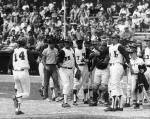 |
1950s The National Junior College Baseball Tourney, nicknamed JUCO, moved here in 1958. It has wide local support. The top ten junior college teams from across the nation come here to compete to be number one. In the spring, JUCO guarantees a rousing series of games which fill the stadium with avid sports fans. This is at Suplizio Field in Lincoln Park. |
|
|
|
|
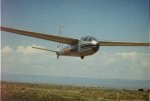 |
1970s Gliders, also called sail planes, have no engines and rely on air currents to power them. They soar as quietly and gracefully as birds, their use becoming popular here in the 1970s and 1980s. Desert hills of the Grand Valley generate strong updraft thermals for soaring. Bill Hill set an international record by flying a 300 km triangular course at an average 120 k.p.h. (Joe Kendrick Photo) |
|
|
 |
1980s Our Colorado Riverfront was an overlooked asset. The Grand Junction/Mesa County Riverfront Commission was formed in 1987. Pat Gormley (l) and Governor Roy Romer (r) are shown explaining the plans. Local funds, state lottery and State Parks Board grants, and volunteer labor have cleaned and transformed the river landscape. Parkland and trails, lakes and wildlife habitat, the Botanical Society and its gardens now grace the shores and islands of the Colorado River. (The Daily Sentinel) |
|
|
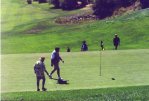 |
1990s Golfing was at the Lincoln Park and Bookcliff Country Club courses. Growing population and wider enthusiasm called for more ranges. On the Redlands the Elks Club developed Tiara Rado, shown here, which the city bought in 1995. Fine new courses since then include Adobe Creek near Fruita, Chipeta on Orchard Mesa, and now the nationally acclaimed Redlands Mesa course. (Vicky Hardy Photo) |
|
|
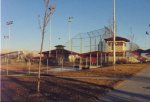 |
2000 & Beyond Canyon View Park is a 110 acre recreation park at the corner of 24 and G Roads. Sports fields accommodate basketball, softball, soccer, volley ball, disc golf, skating, and also picnicking and playgrounds. The city parks department maintains 35 parks, and several trails including the river front; 381.5 acres are available for five new city parks. (Debbie Hartlerode Photo) |
|
|
|
|
If you have
arrived at this page from a search engine |
|